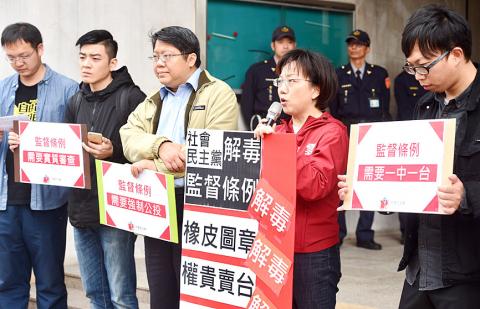Activists yesterday welcomed proposals to transfer the review of supervisory articles governing negotiations with China to a joint legislative committee, calling for amendments and hastening the review process.
“This is an important bill which does not just address internal administrative questions,” said Economic Democracy Union convener Lai Chung-chiang (賴中強), who was part of the Sunflower movement, at a rally outside the Legislative Yuan in Taipei with Social Democratic Party (SDP) activists. “Allowing legislators from all related committees to be included in discussions and to propose substantial amendments is the right direction.”
Passage of supervisory articles was a key demand of the Sunflower movement, which saw student activists occupy the legislature in 2014 to protest an agreement negotiated by the then-Chinese Nationalist Party (KMT) government.

Photo: Peter Lo, Taipei Times
Legislators yesterday clashed over whether review of the supervisory articles should be conducted by the Internal Administration Committee or a special joint legislative committee, allowing lawmakers from the New Power Party (NPP) — which is not represented on the Internal Administration Committee — to vote and directly propose amendments during the review process.
NPP Executive Chairman Huang Kuo-chang (黃國昌) was a prominent Sunflower movement activist, and the party has promised to propose Economic Democracy Union-sponsored amendments to the draft bill.
Lai added that a joint committee review should not be an excuse to delay a committee review.
“What we do not want is for an agreement for a joint committee review, only to see the bill drop out of sight, like a stone sinking to the bottom of the sea,” he said, reiterating activists’ concerns that cross-strait talks are likely to resume next year following the Chinese Communist Party’s 19th National Party Congress this fall.
Lai also called for the Democratic Progressive Party (DPP) to explain how the proposed supervisory articles would affect previously negotiated agreements on trade in services and goods.
Whether the government would be required to submit negotiation plans for a trade in goods agreement after the bill’s passage remains unclear, he said.
It is also unclear whether there will be an article-by-article or package vote on the service trade agreement, he said.
SDP Chairperson Fan Yun (范雲) called for changes to the DPP caucus’ draft bill that would require a substantive review of agreements, automatic referendums on the results of political talks, to redefine “cross-strait relations” as being between “Taiwan and China,” as well as applying any new review requirements to the proposed service trade agreement.
She said that the DPP seemed to have a “goldfish brain” — lacking long-term memory — over the service trade agreement, which served as the catalyst for the Sunflower movement.
“Given that the official draft does not include provisions that would ensure it is retroactively applied to the service trade agreement, how does [the DPP] intend to address the issue? So far it has failed to give us a clear answer,” she said.

MAKING WAVES: China’s maritime militia could become a nontraditional threat in war, clogging up shipping lanes to prevent US or Japanese intervention, a report said About 1,900 Chinese ships flying flags of convenience and fishing vessels that participated in China’s military exercises around Taiwan last month and in January have been listed for monitoring, Coast Guard Administration (CGA) Deputy Director-General Hsieh Ching-chin (謝慶欽) said yesterday. Following amendments to the Commercial Port Act (商港法) and the Law of Ships (船舶法) last month, the CGA can designate possible berthing areas or deny ports of call for vessels suspected of loitering around areas where undersea cables can be accessed, Oceans Affairs Council Minister Kuan Bi-ling (管碧玲) said. The list of suspected ships, originally 300, had risen to about 1,900 as

Japan’s strategic alliance with the US would collapse if Tokyo were to turn away from a conflict in Taiwan, Japanese Prime Minister Sanae Takaichi said yesterday, but distanced herself from previous comments that suggested a possible military response in such an event. Takaichi expressed her latest views on a nationally broadcast TV program late on Monday, where an opposition party leader criticized her for igniting tensions with China with the earlier remarks. Ties between Japan and China have sunk to the worst level in years after Takaichi said in November that a hypothetical Chinese attack on Taiwan could bring about a Japanese

MORE RESPONSIBILITY: Draftees would be expected to fight alongside professional soldiers, likely requiring the transformation of some training brigades into combat units The armed forces are to start incorporating new conscripts into combined arms brigades this year to enhance combat readiness, the Executive Yuan’s latest policy report said. The new policy would affect Taiwanese men entering the military for their compulsory service, which was extended to one year under reforms by then-president Tsai Ing-wen (蔡英文) in 2022. The conscripts would be trained to operate machine guns, uncrewed aerial vehicles, anti-tank guided missile launchers and Stinger air defense systems, the report said, adding that the basic training would be lengthened to eight weeks. After basic training, conscripts would be sorted into infantry battalions that would take

DEEP-STRIKE CAPABILITY: The scenario simulated a PLA drill that turned into an assault on Taiwan’s critical infrastructure, with the launchers providing fire support Taiwan yesterday conducted this year’s first military exercises at Longsiang Base in Taichung, demonstrating the newly acquired High Mobility Artillery Rocket System’s (HIMARS) ability to provide fire support and deep-strike capabilities. The scenario simulated an attack on Penghu County, with HIMARS trucks immediately rolling into designated launch areas and firing barrages at the Wangan (望安) and Cimei (七美) islands, simulating the provision of fire support against invading forces. The HIMARS are supposed to “fire and leave,” which would significantly increase personnel and equipment survivability, a military official said. The drill simulated an exercise launched by the Chinese People’s Liberation Army (PLA) Eastern